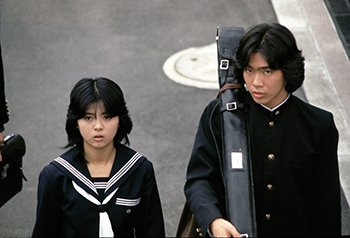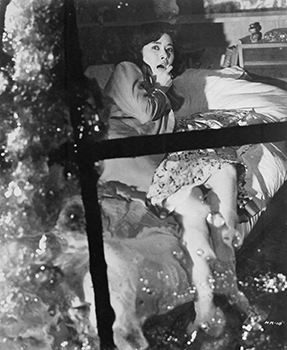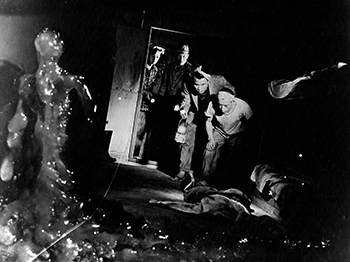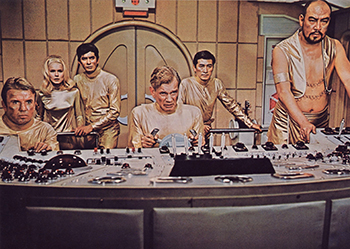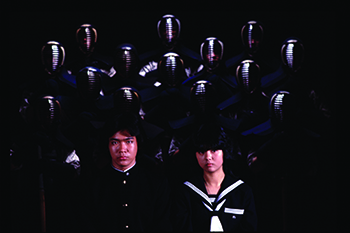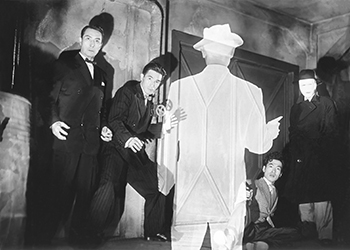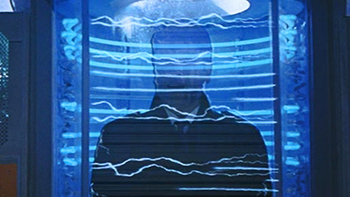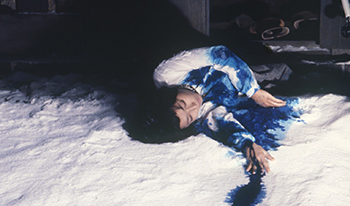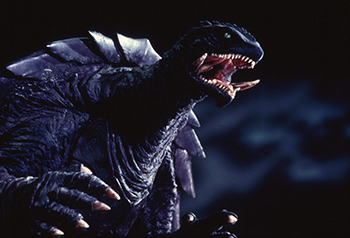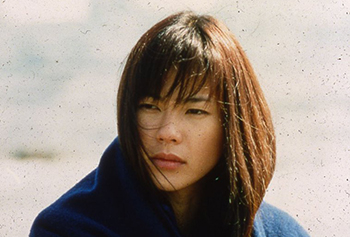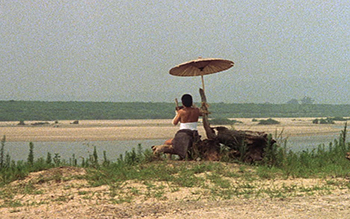 Japan Society New York presents a Japanese science fiction film series starting March 24th. Photos courtesy of Japan Society.
Japan Society New York presents a Japanese science fiction film series starting March 24th. Photos courtesy of Japan Society.From the Shadow of Japan`s Most Famous Movie Monster, Rare Sci-Fi/Fantasy Films Invade NYC Source: Japan Society press release Special Thanks to Shannon Jowett Beyond Godzilla: Alternative Futures & Fantasies in Japanese Cinema March 24-April 8, 2017, at Japan Society New York, NY -- For more than 60 years, Godzilla has captivated audiences and ignited imaginations around the world, with recent wildly popular reboots in both the U.S. and Japan, and several sequels/spinoffs currently in production. "Ever since Ishiro Honda’s 1954 GODZILLA first rampaged across screens, its title monster has become both Japan’s best-known pop culture export and a universal symbol of mass destruction," notes film critic and writer Mark Schilling. "But Godzilla has also cast a long, scaly shadow obscuring Japan’s other live-action contributions to the sci-fi/fantasy genre."
To showcase the wide-ranging imagination of the Japanese sci-fi/fantasy genre, Schilling has curated Beyond Godzilla: Alternative Futures & Fantasies in Japanese Cinema, highlighting many remarkable entries within the rich and varied universe of Japanese tokusatsu (“special effects”) films. The seven-film series, adapted from its original presentation at the 2016 Far East Film Festival, takes place at Japan Society from March 24 to April 8. Including innovative B-movies, kaiju eiga ("monster movies") and non-Godzilla classics involving director Ishiro Honda and effects maestro Eiji Tsuburaya, these films are rarely screened in the U.S. and most are unavailable on DVD or for streaming. The series launches with one Honda`s best non-Godzilla films of all time, THE H-MAN (March 24), featuring an introduction by Schilling and followed by an opening night party. Further titles include the high camp international co-production LATITUDE ZERO (March 25); SCHOOL IN THE CROSSHAIRS (March 31), a fantastical gem from genre master Nobuhiko Obayashi; the ultra-rare INVISIBLE MAN (April 1); sci-fi mutant thriller THE SECRET OF THE TELEGIAN (April 1); the controversial cult film BLUE CHRISTMAS (April 8); and a 4k restoration of 1999`s GAMERA 3: REVENGE OF IRIS (April 8), widely considered the best entry of the 12-film franchise. A series curator lecture will be held March 25 in advance of that day`s screenings.
"As with all good sci-fi and fantasy films, the genre framework offers fertile ground for social commentary, using imagined futures and alternative realities to address its past or current problems -- the aftermath of war, government oppression, the effects of environmental catastrophe, etc.," says Aiko Masubuchi, senior film programmer at Japan Society. "Just as GODZILLA is often read as a direct response to postwar nuclear anxieties, several of these films (THE H-MAN, BLUE CHRISTMAS, GAMERA 3) present some monstrosity or perversion of humanity whose mysterious origins stem from an unknown `out there` but can easily be linked to very real national traumas or anxieties. Alternately, some films (LATITUDE ZERO, SCHOOL IN THE CROSSHAIRS) go a step further to present an alternative reality in which a fantastical, Utopian solution is presented to resolve the conflict -- whether that is an underwater Shangri-La where peace, social progressivism, and scientific advances can flourish or the selfless, pure heart of a teenager that can defeat fascist aliens. We are thrilled to present these underseen films as testament to the innovation and range Japan’s sci-fi/fantasy film tradition, many of which still resonate with our current historical moment." Mark Schilling is a reporter, critic and author specializing in Japanese films and popular culture. He has been reviewing Japanese films for The Japan Times, since 1989, while covering the Japanese film industry for Screen International from 1990 to 2005 and for Variety from 2005 to the present. He has written and contributed to many books, including The Encyclopedia of Japanese Pop Culture (Weatherhill, 1997), Contemporary Japanese Film (Weatherhill, 1999), The Yakuza Movie Book (Stone Bridge Press, 2003), No Borders, No Limits: Nikkatsu Action Cinema (2007) and Nudes! Guns! Ghosts! The Sensational Films of Shintoho (2010) and Beyond Godzilla: Alternative Futures and Fantasies in Japanese Cinema. Beyond Godzilla: Alternative Futures & Fantasies in Japanese Cinema is made possible through the generous support of The Globus Family. Japan Society’s Film Programs are supported by the Lila Wallace-Reader’s Digest Endowment Fund. Additional season support is provided by The Globus Family, James Read Levy, Masu Hiroshi Masuyama, Laurel Gonsalves, Dr. Tatsuji Namba, Mr. and Mrs. Omar H. Al-Farisi, David S. Howe, Geoff Matters, and Michael Romano. Admission: $13/$10 seniors & students/$9 Japan Society members, EXCEPT screening of THE H-MAN + Opening Night Party: $16/$13 seniors & students/$12 Japan Society members. Special offers: Purchase 3 tickets for at least 3 different films in the same transaction and receive $2 off each ticket. Tickets may be purchased online at japansociety.org, in person at Japan Society, or by calling the box office at 212-715-1258. SCHEDULE & FILM DESCRIPTIONS All films are in Japanese with English subtitles unless otherwise noted. 18+ -- These films are unrated but recommended for persons 18 years of age and older.
THE H-MAN (???????, Bijo to Ekitai Ningen) Friday, March 24 at 7 PM **Followed by Opening Night Party **Introduction by series curator Mark Schilling 1958, 79 min., 16mm, color, in English. Directed by Ishiro Honda. With Kenji Sahara, Yumi Shirakawa, Akihiko Hirata. Special effects by Eiji Tsuburaya. Based on a scenario by Toho actor Hideo Unagami, this Ishiro Honda classic blends sci-fi, horror and noir to spooky and thrilling effect. A continuation of Japanese post-WWII nuclear anxiety, the H-Man of the title is a creature formed of radioactive goo that is driven to liquefy humans -- and can only be vanquished by electrifying or incinerating it to vapor. The film’s science may be dodgy but the tense climatic chase through underground sewers, with H-Men lurking about, is a Honda career highlight. Originally shot in Japanese with a running time of 86 min, this film was reedited to 79 min. with an English-language dub for U.S. distribution; this series screens the U.S. version of the film.
LATITUDE ZERO (??0???, Ido Zero Daisakusen) **Introduction by series curator Mark Schilling Saturday, March 25 at 7 PM 1969, 89 min., HDCAM, color, in Japanese with live English subtitles. Directed by Ishiro Honda. With Akira Takarada, Joseph Cotton, Cesar Romero, Masumi Okada. Special effects by Eiji Tsuburaya. Starring Joseph Cotten, Cesar Romero and Richard Jaeckel -- then Hollywood actors well known to Japanese fans -- LATITUDE ZERO was Toho’s attempt to make an “international” film, though the studio had to downsize the budget when its U.S. production partner bailed. Nonetheless this genre mash-up of 20,000 Leagues under the Sea, Lost Horizon and The Island of Dr. Moreau has its charms, from its sleek giant submarines to an undersea Shangri-la, ruled by Cotten’s urbane, benevolent sub captain, that still looks inviting. Originally shot in English with a running time of 105 min, this film was reedited to 89 min. with a Japanese-language dub for Japanese distribution; this series screens the Japanese version of the film.
SCHOOL IN THE CROSSHAIRS (???????, Nerawareta Gakuen) Friday, March 31 at 7 PM 1981, 90 min., DCP, color, in Japanese with live English subtitles. Directed by Nobuhiko Obayashi. With Hiroko Yakushimaru, Ryoichi Takayanagi, Toru Minegishi, Makoto Tezuka. This early “idol” movie by genre master Nobuhiko Obayashi (HOUSE) features Hiroko Yakushimaru, then the heartthrob of millions of Japanese fans, as a spunky teen defending her high school from infiltration and domination by fascistic aliens. The action is more mind-bendingly fantastic than soberly scientific, featuring delightfully bizarre effects designed by Obayashi himself. A characteristically personal film produced by the maverick Haruki Kadokawa, SCHOOL IN THE CROSSHAIRS’ “human love conquers all” narrative can be read as symbolic of Obayashi’s own resistance to the dominant film industry and conformist practices in assertion of his own individual creativity and vision.
INVISIBLE MAN (????, Toumei Ningen) Saturday, April 1 at 4:30 PM 1954, 70 min., HDCAM, b&w, in Japanese with live English subtitles. Directed by Motoyoshi Oda. With Seizaburo Kawazu, Miki Sanjo, Keiko Kondo, Minoru Takada. One of the many films inspired by the 1897 H.G. Wells sci-fi novella The Invisible Man (including a 1949 film by the Daiei studio), Toho’s INVISIBLE MAN was released less than two months after GODZILLA with Eiji Tsuburaya handling effects for both films. For the former Tsuburaya used optical compositing to enhance the illusion of invisibility, such as a motor scooter ridden by the invisible hero that seems to move on its own. Meanwhile, the ending recalls the famous farewell-in-a-fireball climax of Raoul Walsh’s WHITE HEAT. This is a very rare film for which Japan Society is creating original English subtitles.
THE SECRET OF THE TELEGIAN (????, Densou Ningen) Saturday, April 1 at 7 PM 1960, 85 min., HDCAM, color, in Japanese with live English subtitles. Directed by Jun Fukuda. With Koji Tsuruta, Yumi Shirakawa, Akihiko Hirata, Tadao Nakamaru. Directed by Jun Fukuda and scripted by Shinichi Sekizawa, who were to later work together on Godzilla series entries, THE SECRET OF THE TELEGIAN is a fast-paced thriller with a sci-fi twist: a scientist uses teleportation -- and the services of a former military man -- to revenge himself on other ex-soldiers who tried to kill him during the war. Once again Eiji Tsuburaya supplies the effects, including a teleportation device that sparks and crackles in a spookily vivid electric blue. Similar to THE H-MAN, the narrative framework is a detective story in which mysterious murders are investigated. Also similarly, there is an echo of WWII and continued anxiety about Japan’s wartime past coming back to haunt it, unable to be repressed or buried completely.
BLUE CHRISTMAS (????????, Buru Kurisimasu) Saturday, April 8 at 4 PM 1978, 133 min., HDCAM, color, in Japanese with live English subtitles. Directed by Kihachi Okamoto. With Hiroshi Katsuno, Keiko Takeshita, Kunie Tanaka, Tatsuya Nakadai. Best known for his samurai and war films, Kihachi Okamoto (SWORD OF DOOM) made BLUE CHRISTMASs from So Kuramoto`s original script as a rare sci-fi for adults. Despite a sensationalistic premise -- contact with mysterious UFOs creates a new “race” of humans with blue blood -- the film offers a serious critique of social discrimination and government oppression. A box office disappointment at the time of its release, it has since acquired cult cachet in Japan, while still dividing critics and fans. With very little in the way of special effects, the film’s socially-conscious premise echoes multiple historical episodes of violent reactionary government action against ideological enemies, such as the U.S. during the Red Scare of the 1950s, as well as the various horrifying ethnic cleansing campaigns of the 20th century.
GAMERA 3: REVENGE OF IRIS (???? ?????????, Gamera 3, Irisu Kakusei) Saturday, April 8 at 7 PM **4k Digital Restoration 1999, 108 min., DCP, color, in Japanese with English subtitles. Directed by Shusuke Kaneko. With Shinobu Nakayama, Ai Maeda, Ayako Fujitani. Starting in 1995 with GAMERA: THE GUARDIAN OF THE UNIVERSE, Shusuke Kaneko rebooted the Gamera tokusatsu series with a new trilogy starring the titular flying giant turtle. The third film, which mixes ancient folktales about monsters asleep in mountains with modern fears about scientific horrors, is the best of the lot -- one big reason being the monster-versus-monster battles created by effects supervisor Shinji Higuchi (SHIN GODZILLA) intended to frighten and awe, not amuse with campy antics. Gamera was introduced by Daiei studios in 1965 as a competitor of Toho’s Godzilla series, but has since gained his own popularity. It was through this Shusuke Kaneko-directed reboot trilogy that Shinji Higuchi made a name for himself as one of the best special effects directors in the industry. He went on to direct the live adaptation of ATTACK ON TITAN (2015) and co-direct SHIN GODZILLA (2016) with EVANGELION creator Hideaki Anno. This film (11th in the franchise, 3rd in the reboot series) is commonly regarded as the best Gamera film of all time among fans. RELATED EVENTS Series Curator Lecture: Beyond Godzilla Saturday, March 25 at 5 PM Beyond Godzilla series curator Mark Schilling traces the evolution of the sci-fi/fantasy genre in Japan that (save for one big, scaly beast) remains largely neglected, considering its prewar origins to the present. The lecture introduces Schilling’s selections and provide context for their inclusion in relation to the history of sci-fi/fantasy films in Japan, from Toho sci-fi epics helmed by Ishiro Honda and Eiji Tsuburaya to fantasies by pioneering indie auteur Nobuhiko Obayashi and beyond. Approx. 60 min. This event is free with the purchase of a ticket to any film in the series. Seating is limited. Ticketholders will be accommodated on a first-come, first-served basis. Godzilla Legend—Music of Akira Ifukube Friday, April 28, 7:30 PM Menacing monsters come to life to life through music in this evening of favorite marches, melodies, vibes and reverbs from the Japanese cult classic Godzilla! Performed by Japan’s forever-young techno-pop band Hikashu and special guest musicians including the spunky sister duo Charan-Po-Rantan, this concert showcases the remarkable range of music composed by Akira Ifukube (1914—2006), who was known for creating some of the most memorable aural moments in cinematic history. Tickets: $32/$28 Japan Society members. MORE UPCOMING FILMS AT JAPAN SOCIETY
Monthly Classics: MABORISI (???, Maboroshi no Hikari) Friday, March 10 at 7 PM 1995, 110 min., 35mm, color, in Japanese with English subtitles. Directed by Hirokazu Kore-eda. With Makiko Esumi, Takashi Naito, Tadanobu Asano. The first narrative feature by Hirokazu Kore-eda is a contemplative and poetic film about loss and the ever-present specter of death. Yumiko and Ikuo lead a quiet, happy life together in Osaka that gets suddenly disrupted when Ikuo is killed by a train in an apparent suicide. Although she eventually remarries and relocates to a quiet seaside village, Yumiko is continually haunted by the experience, struggling to understand why it happened. Beautifully shot with an emphasis on silhouettes, shadows and natural light, MABORISI remains one of Kore-eda’s most visually striking films and early testament to his exceptional talents. Tickets $13/$11 seniors & students/$5 Japan Society members.
Monthly Classics: ZATOICHI THE FUGITIVE (??????. Zatoichi Kyojo Tabi) Friday, April 7 at 7 PM 1963, 86 min., 35mm, color, in Japanese with English subtitles. Directed by Tokuzo Tanaka. With Shintaro Katsu, Miwa Takada, Masayo Banri. The fourth episode in the immensely popular 25-film action series features the iconic blind swordsman Zatoichi (Shintaro Katsu) going up against a legion of local yakuza henchmen who target him after he defeats them in a wrestling tournament and then kills one of their own in self-defense. Composer Akira Ifukube, most famous for his work on the Godzilla film series, provides a characteristically spare and artful score. Tickets $13/$11 seniors & students/$5 Japan Society members.
About the Japan Society Film Program
The Japan Society Film Program offers a diverse selection of Japanese films, from classics to contemporary independent productions. Its aim is to entertain, educate and support activities in the Society`s arts and culture programs. Japan Society has actively introduced Japanese cinema to New York’s international audiences since the 1970s, presenting works by the era’s then-new giants such as Shohei Imamura, Seijun Suzuki, and Hiroshi Teshigahara upon their first release, and groundbreaking retrospectives on now canonical figures such as Kenji Mizoguchi and Yasujiro Ozu. The Film Program has featured retrospectives of great directors, thematic series and many U.S. premieres, and toured some series to other U.S. venues. While Japan Society’s repertory film programming gained new momentum and institutional support in the 70s as a full-fledged program, the first screening at Japan Society was actually in 1922, a four-reel film of then Crown Prince Hirohito’s 1921 visit to Europe. For more, visit japansociety.org/film.
About Japan Society
Founded in 1907, Japan Society is a multidisciplinary hub for global leaders, artists, scholars, educators, and English and Japanese-speaking audiences. At the Society, more than 100 events each year feature sophisticated, topically relevant presentations of Japanese art and culture and open, critical dialogue on issues of vital importance to the U.S., Japan and East Asia. An American nonprofit, nonpolitical organization, the Society cultivates a constructive, resonant and dynamic relationship between the people of the U.S. and Japan. Japan Society is located at 333 East 47th Street between First and Second avenues (accessible by the 4/5/6 and 7 subway at Grand Central or the E and M subway at Lexington Avenue). For more information, call 212-832-1155 or visit japansociety.org.


